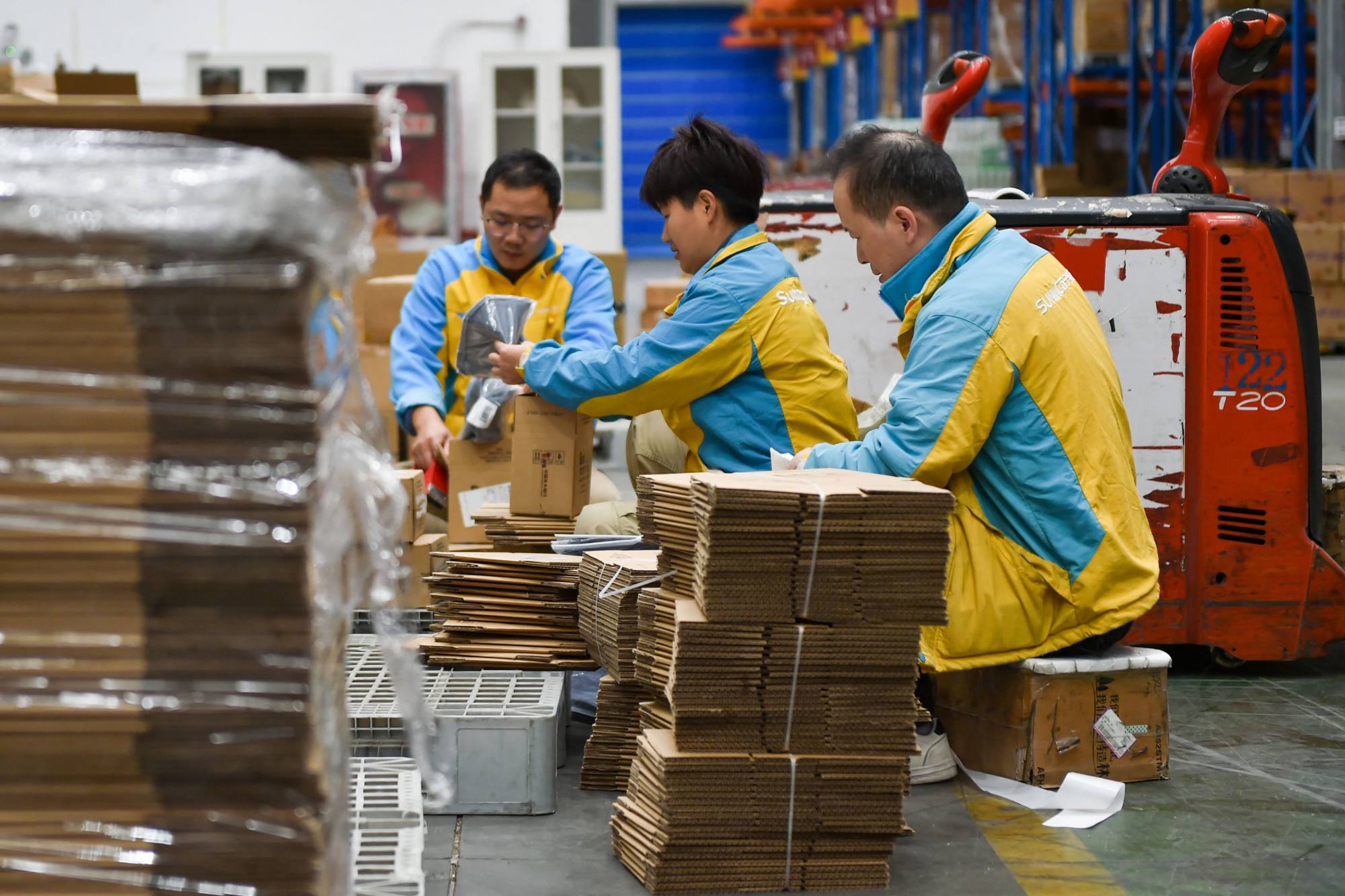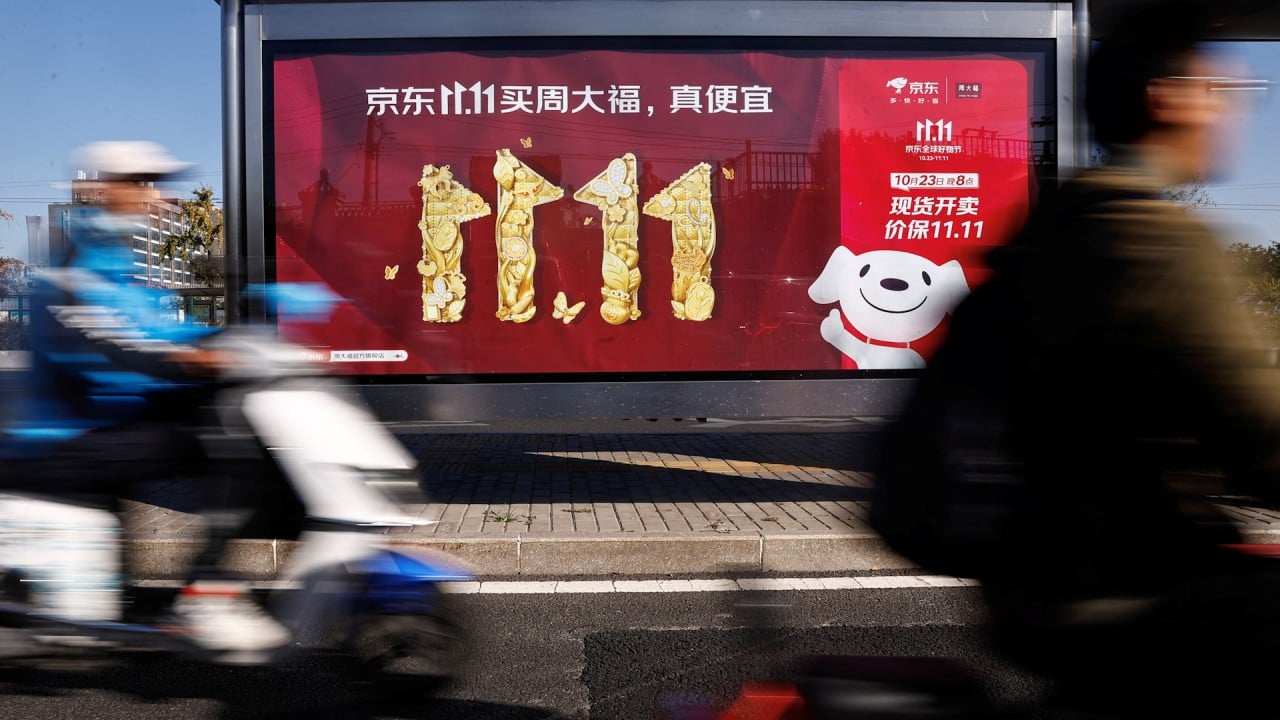
Chinese consumers on the hunt for low prices, local brands on Singles’ Day shopping festival as economy shows signs of turning a corner
- China’s e-commerce giants are counting on bargain-basement prices in their Singles’ Day campaigns to attract more value-conscious consumers
- Online shopping platforms under Alibaba’s Taobao and Tmall Group remain the top marketplaces for consumers on Singles’ Day this year, a survey said

“The Chinese macroeconomic headwinds that are making consumers more value-conscious have been well publicised,” the report said. These include “a slowdown in the country’s previously strong GDP growth, relative weakness in consumer confidence and concerns over the property market”.
“The [online shopping] platforms are trying to differentiate themselves to fight for consumers, as they see the growth of [China’s] e-commerce population gradually slowing down at the current high penetration rate,” said Kenny Yao, Shanghai-based director of global consultancy AlixPartners. “If they can’t provide consumers with a differentiated experience, the easiest way to attract them is to lower prices.”
In light of increased competition and a sputtering economy, China’s e-commerce industry does not expect to post another record turnover during this year’s Singles’ Day – also known as “11.11”, referring to the traditional 24-hour shopping extravaganza on November 11.
Alibaba, JD.com roll out low-price strategies for Singles’ Day amid tight economy
“This year’s Double 11 is very different from the previous year as it marks an important defensive war by the traditional e-commerce sites against live-streaming platforms,” said Zhang Yi, founder and chief analyst at market consultancy iiMedia. “Live-streaming e-commerce has grown so rapidly thanks to the low prices it offers, as well as the low cost of attracting customers through short videos.”
Alibaba’s Taobao and Tmall Group said they are focusing on “serving Chinese consumers looking for value-for-money products by offering the best deals”, as its platforms feature more than 80 million products at their lowest prices this year.
Beijing-based rival JD.com, meanwhile, has offered a 10 billion yuan (US$1.4 billion) subsidy campaign since March, touted as “its largest sales promotion event in history”.
The firm is also offering 30-day, best-price guarantee for more than 800 million products. If shoppers find more affordable goods elsewhere for items they bought on JD.com during its promotion, the e-commerce firm will compensate them for the price difference.

While it remains to be seen what the Chinese e-commerce players’ final sales tally will be this year, these platforms are expected to keep mum on those figures, just as they did last year, amid consumers’ lethargic attitude to spending big this Singles’ Day.
“I have no interest to buy items other than daily necessities, no matter how hard the platforms promote their discounts,” said 26-year-old Emily Zhao, an employee at an internet company in Shanghai.
A long-time video gamer, Zhao said she spent nearly 6,000 yuan to buy a handheld game console in last year’s Singles’ Day, but has lost the passion to buy new gadgets this year.

Another online consumer that has put a lid on spending for this year’s Singles’ Day is Shenzhen resident Capy Ding, who used to stock up on contact lenses and various skincare products during past festivals.
“In previous years, I usually spent around 2,000 yuan to buy enough contact lenses for a whole year, but this time I can only stock up for half a year with the same amount of money,” Ding said. “That means prices have doubled. I have definitely tightened my belt this year.”
Mothers and the younger generation born after 2000 in third- and fourth-tier cities have favoured local brands, buying local beauty products, home appliances and sports products from big-name domestic labels, Pinduoduo said in late October. White-collar workers and middle-class consumers in first tier cities are buying more day-to-day goods such as fruit and cat food, as well as digital products.
Pinduoduo sees sales jump during Singles’ Day promotion
The rise of domestic brands, which have lower prices and are marketed aggressively to local consumers, has also increasingly threatened the market share of foreign brands.
“Many foreign brands created a higher-end image in the past, which seemed to be naturally attractive to Chinese consumers, AlixPartners’ Yao said. “But this approach may become more difficult in the future.”
“We do not drastically reduce prices to achieve a certain performance at this point in time. This is not what we are doing now,” said Winnie Shao, chief marketing officer at Muji China, during a media interview in Shanghai on Thursday.
“Because people have more freedom this year, whether travelling or going outdoors, some lightweight items that can be used at home or easily taken out have become an important category in this round of campaigns,” said Shao, referring to the post-pandemic situation in China’s retail industry.

Despite the sluggish mood among consumers, recent retail data has shown improvement in the market. In the third quarter, mainland China’s retail sales grew by 5.5 per cent in September, compared with a 4.6 per cent increase in August.
“The silver economy is expected to continue to be a growing force behind Singles’ Day,” AlixPartner’s Singles’ Day report said. “With the rise of China’s middle class, more affluent senior shoppers are spending on premium products that improve their quality of life.”
Government employee Shen from Jiangsu, meanwhile, pointed out that local consumers have to adapt to the current state of the market. “After all, the economy has its own cycles and we have to live along with them,” she said.
On Wednesday, Shen said she received a message from Estee Lauder that her premium membership will be downgraded at the end of this month because she has not bought any of the brand’s products for a period. Unfazed, Shen said she is happy with her choices.
Additional reporting by Daniel Ren



